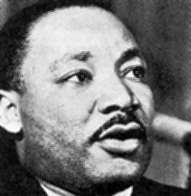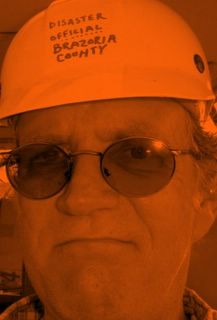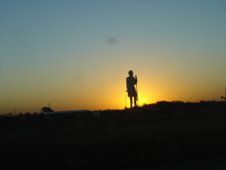On Martin Luther King Day, my informal racial relations history

We were forbidden to say "nigger" in our house.
That's how our parents taught us. Mom and Dad were from "the north." Wisconsin, to be precise.
As a kid, that's how I explained to myself why my parents didn't use that epithet and some other parents, and consequently their offspring, occassionally would use it -- cause my parents were from "the north."
I still remember, when I was very young, I was playing with some of the kids in the neighborhood when one of them got mad at somebody else and said, "You nigger!"
I immediately stopped and told the kid, "You said a bad word."
He stopped and looked at me, completely befuddled.
Then we carried on with whatever the hell we were doing. Probably playing "Civil War" or "the Alamo" or just horsing around.
Even so, "nigger" was not a word invoked on a daily basis, even though I was born and raised in a refinery town 30 miles east of Houston that was as segregated as any other town in Texas.
I'm old enough to remember going with my mother to the Henke & Pilot grocery store, where there were two sets of drinking fountains and two sets of restrooms. One day, while leaving the store, I dashed up to the water fountain for quick swig of cold water. My mom gently corrected me, telling me to drink out of the other fountain. I looked up at the sign on the wall. "Colored only" or something like that, it said.
I was too young, or lacked the intellectural curiosity, to ask why there were two sets of water fountains, and my mother was of no mind to challenge the local custom. This was around the late '50s, I guess.
To further draw the picture of my segregated suburbia, for a time we had a black "Mammy," to use the vernacular. We weren't rich but were firmly esconced in the rising middle class (Dad was an engineer for Humble Oil & Refining). Her name was Birdie. She had a lot of gold in her teeth, wore a white uniform and seemed to always be in a good humor. My mom wasn't in the best of health (she survived colon cancer and went on to live til the age of 83) and Birdie did a lot of the house cleaning and child tending.
One day, Birdie's ride home fell through and I went with my Dad to take her home to McNair, the "colored" community north of Baytown. I remember thinking Birdie's house and neighborhood sure looks different from ours.
In elementary school there were no black kids. In junior high there was one. His name was Jesse. He never had anything to say and no one, including me, engaged him in conversation, so he essentially remained a quiet mystery to me and the rest of the white kids.
Then, it was on to high school. Robert E. Lee High School.
In one English class, I remember reading Martin Luther King's "Letter From Birmingham Jail," but racial consciousness and change were not the order of the day back then.
At our football games, along with the Stars and Stripes and the Lone Star of Texas, the Confederate battle flag was carried. The girls drill team, the Brigadiers, dressed in Confederate military style garb. Their "officers" carried swords and wore plumed hats while the rank-and-file gals banged drums or played bugles during their half-time military drills on the field of battle. (They were even in Life magazine once; something about the largest all-girl drum and bugle corps in the USA.)
Oddly enough, we weren't called the Rebels. We were the Ganders due to Baytown's oil-laden history along Goose Creek.
By then, there were a small number of black kids at Baytown Lee High School. Segregation was officially over, but I never had a black teacher in the classroom. I did have a black coach, Roy Hutchins, who was assigned to my junior high when the town's black high school finally was desegregated. He went to work at the high school the same year I moved on to the 9th grade. One year, he brought one of his former student/athletes from his coaching days at Baytown's Carver High School over to the field house to talk to the football team. That was Gene Washington, then of the Minnesota Vikings.
Coach Hutchins' nickname for me was "Gabby," because I was exceedingly quiet. My other memory of him was one day he was driving me to Houston, where he lived, maybe to watch a track meet or something. His ashtray was full of cigarette butts (he died of cancer before I graduated) and he had a news/talk station tuned on the radio. He said he always listened to news/talk radio, he said, "cause you can learn somethin'."
By the time I was a high school junior, I was on the varsity football team. We had a hell of a squad, eventually becoming the 4th ranked 4A team in the state (there wasn't a 5A classification then.) We had four black guys on the team: Charlie Morgan, a running back, Charlie LeBlue, a tight tend, Thomas Hart, a cornerback, and Don Brown, a defensive lineman known by his nickname, "Boog Nose." All were in the starting lineup.
But in the middle of the season there was trouble, trouble over that Confederate battle flag that was carried up and down the field at half-time. There was talk that the black players were going to boycott an upcoming game. There were closed-door meetings. Somehow, I don't know how, it got smoothed over and they carried on with the team, which eventually won 9 straight games before losing the last game of the regular season (to Angleton! after we got the big head) and then losing the second game at the regional stage of the playoffs (to Port Arthur Jefferson.)
I never did hear how they persuaded the black guys to call off their boycott, but eventually, long after I had moved away, the school got rid of the Confederate battle flag, and now, they don't even have the female drum and bugle corps that once marched in Confederate garb.
After high school, it was on to college at the University of Texas at Austin. There weren't a lot of black students there, but I do distincly remember seeing Roosevelt Leaks around the Communications Building on occasion. He was the starting running back for the Horns and later played a time for the Baltimore Colts.
So that's my recollections on race here on Martin Luther King Day.
How're we doing?
Better, I'd say.
Recently, we became acquainted with a number of black families from New Orleans who relocated to Lake Jackson from New Orleans following Hurricane Katrina. I was a little concerned how their reception might be.
See, a guy we know who grew up down here told me that when he was a kid, he remembers the Lake Jackson police chief would routinely tell black people when dusk was about to fall to go on back home to Clute now. But the way the chief put it, my friend said, was, "OK, you niggers go back on home now."
I have no way of knowing this is true, but that's what my friend recollects.
The New Orleans families, though, have been received just fine. Some of them say their new white neighbors brought over pies or cakes to welcome them to Lake Jackson, and their kids seem to be getting along well in the mostly white schools.
So, yeah, I think we're doing better.
And whenever racial issues come up on the news or in real life, I always think back to my parents and how fortunate I was that they taught my sister, brother and I not to call people niggers.
==============================
other notable MLK postings in Bloggerville:
[Slampo's Place]
[Isolated Desolation]
[Brains and Eggs]














1 comment:
I am a Robert E. Lee Hign School graduate of 1989. It was very interesting to read this piece of history. I must say, when I was taught a REL, the BEST teacher I had was my algebra teacher...who was African-American. I think his name was Mr. Thomas. GREAT TEACHER!!!
Anyway, I can proudly say that racism was not an issue from 1985-1989. From star football players,cheerleaders, homecoming queens, class president..etc.etc. consisted of some of my dearest friends who were African-American.(Quentin Coryatt, Chris McGaughey, Pascal Watty, Debbi Gardener,Kevin Baskin, Connie White, and Desiree Thomas) I feel blessed and proud to say that as a RE Lee class of 89 graduate; I did not know that they were any different than me. I hope and pray that our children's children will only see racism in the textbooks of history.
My 11 year old daughter's best friend of 7years is the sweetest girl, Adrien. I gleam with pride when I see their pictures proudly displayed on her dresser. Thanks Dr. MLK!!!!!!
Post a Comment